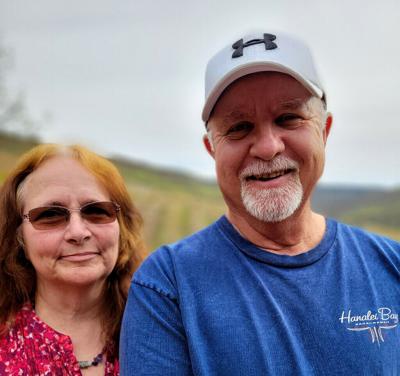Casey and Jody Pink of Pink Orchards will take a break from their busy spring season to serve as King and Queen Bing of the Northwest Cherry Festival in The Dalles.
Raised on the cherry farm his father started in 1954, Casey is happy to represent one of the main industries in Wasco County.
“I love raising cherries and living in a cherry orchard,” Casey said. “It’s like living in a park. We plan to continue farming cherries as long as we spend less than we make.”
Casey is also president of The Dalles Irrigation District, which draws its water from the Columbia and distributes it to growers. He’s served on the board for about a dozen years now.
Over the decades — he’s 66 now — Casey has seen a lot of change in the cherry industry. Like his royal title suggests, Bing used to be king. Now, that particular varietal is on its way out, and orchards like his that once grew just Bings and Royal Anns now have 15 types of cherries.
The new varietals all peak at different times, meaning harvest lasts longer, but they need half as many people for harvest as they used to.
Cherry trees are shorter now, about 10 feet instead of up to 18, making harvesting them safer and quicker, and they’re planted closer together.
Watering is much more scientific and economical. He can get soil moisture readings from his phone using sensors throughout the orchard. Gone are large, wasteful sprinkler system, replaced by more efficient micro and drip systems.
The job has changed in other ways too: More regulations and inspections. Costs are going up by a third on some things, a few have doubled. Still to be seen is the sticker shock of shipping this year.
Growing up as a child on the farm, some of Casey’s fondest memories were the relationships he built running around the orchard with other kids that came with their families. Over the years, Casey evolved into the boss but continued to employ the same families that have come for harvest year after year creating a sense of family.
The name of the business is actually Pink & Pink Orchard LLC. It once stood for when he joined his dad in the business when he was in his 20s. Now it stands for him and his son, Josh. Josh has two boys, so maybe it will take on yet another similar meaning in another generation.
Further keeping things in the family, Casey’s wife Jody takes care of the books for the operation. And while he’s growing cherries, she likes to garden.
Casey’s parents bought their first cherry orchard in 1954. “That was the year of a great big freeze that killed half their orchard, so that’s how they started. They really, really had a hard time getting started but they were tough and they made it.”
Casey went off to school and had a few jobs in his 20s before coming back home to join his dad in the business.
The recent snow storm was a first for Casey. “I’ve been around for 66 years and I’ve never seen snow stick on cherry trees when they were in full bloom.”
He doesn’t think the snow harmed the cherries; in fact, it may have insulated the cherries from frosts. Cherries are about 1/16 of an inch long right now, and bright green. It’s easy to tell if they freeze because they turn black within a day, and that hasn’t happened.
Being constantly at the mercy of weather and the global market isn’t for the “faint of heart,” Casey said. “I put my faith in God, he’s never let me down before, so I don’t stress over it. I know that one way or another we’re going to be OK.”




















Commented